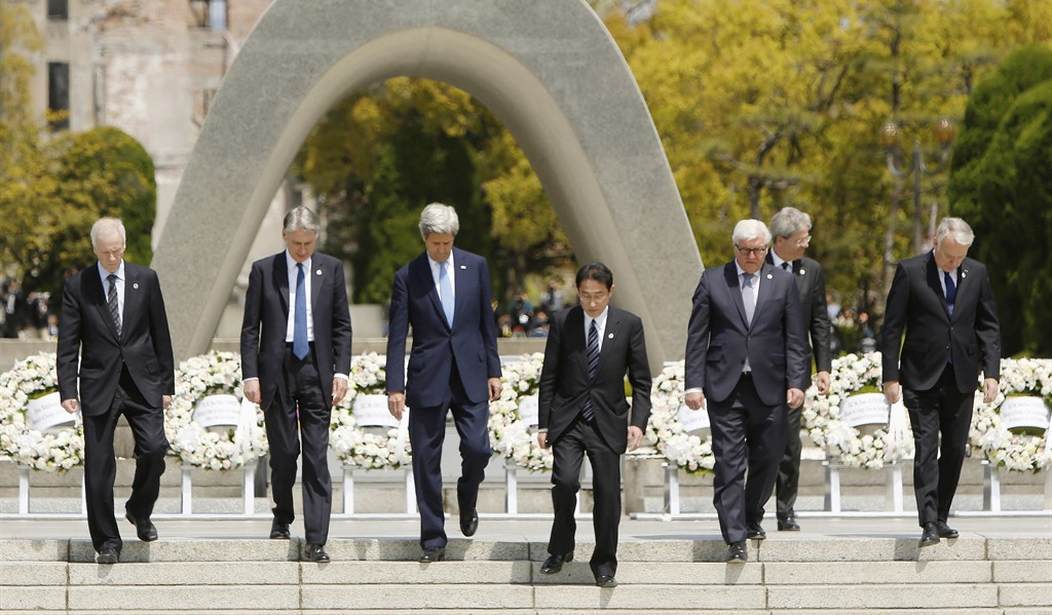The dropping of two atomic bombs on the Japanese cities of Hiroshima and Nagasaki in August 1945 remains the only wartime use of nuclear weapons in history.
No one knows exactly how many Japanese citizens were killed by the two American bombs. A macabre guess is around 140,000. The atomic attacks finally shocked Emperor Hirohito and the Japanese militarists into surrendering.
John Kerry recently visited Hiroshima. He became the first Secretary of State to do so -- purportedly as a precursor to a planned visit next month by President Obama, who is rumored to be considering an apology to Japan for America's dropping of the bombs 71 years ago.
The horrific bombings are inexplicable without examining the context in which they occurred.
In 1943, President Franklin Roosevelt and British Prime Minister Winston Churchill insisted on the unconditional surrender of Axis aggressors. The bomb was originally envisioned as a way to force the Axis leader, Nazi Germany, to cease fighting. But the Third Reich had already collapsed by July 1945 when the bomb was ready for use, leaving Imperial Japan as the sole surviving Axis target.
Japan had just demonstrated with its nihilistic defense of Okinawa -- where more than 12,000 Americans died and more than 50,000 were wounded, along with perhaps 200,000 Japanese military and civilian casualties -- that it could make the Americans pay so high a price for victory that they might negotiate an armistice rather than demand surrender.
Tens of thousands of Americans had already died in taking the Pacific islands as a way to get close enough to bomb Japan. On March 9-10, 1945, B-29 bombers dropped an estimated 1,665 tons of napalm on Tokyo, causing at least as many deaths as later at Hiroshima.
Recommended
Over the next three months, American attacks leveled huge swaths of urban Japan. U.S. planes dropped about 60 million leaflets on Japanese cities, telling citizens to evacuate and to call upon their leaders to cease the war.
Japan still refused to surrender and upped its resistance with thousands of Kamikaze airstrikes. By the time of the atomic bombings, the U.S. Air Force was planning to transfer from Europe much of the idle British and American bombing fleet to join the B-29s in the Pacific.
Perhaps 5,000 Allied bombers would have saturated Japan with napalm. The atomic bombings prevented such a nightmarish incendiary storm.
The bombs also cut short plans for an invasion of Japan -- an operation that might well have cost 1 million Allied lives, and at least three to four times that number of well-prepared, well-supplied Japanese defenders.
There were also some 2 million Japanese soldiers fighting throughout the Pacific, China and Burma -- and hundreds of thousands of Allied prisoners and Asian civilians being held in Japanese prisoner of war and slave labor camps. Thousands of civilians were dying every day at the hands of Japanese barbarism. The bombs stopped that carnage as well.
The Soviet Union, which signed a non-aggression pact with Japan in 1941, had opportunistically attacked Japan on the very day of the Nagasaki bombing.
By cutting short the Soviet invasion, the bombings saved not only millions more lives, but kept the Soviets out of postwar Japan, which otherwise might have experienced a catastrophe similar to the subsequent Korean War.
World War II was the most deadly event in human history. Some 60 million people perished in the six years between Germany's surprise invasion of Poland on Sept. 1, 1939, and the official Japanese surrender on Sept. 2, 1945. No natural disaster -- neither the flu pandemic of 1918 nor even the 14th-century bubonic plague that killed nearly two-thirds of Europe's population -- came close to the death toll of World War II.
Perhaps 80 percent of the dead were civilians, mostly Russians and Chinese who died at the hands of Nazi Germany and Imperial Japan. Both aggressors deliberately executed and starved to death millions of innocents.
World War II was also one of the few wars in history in which the losers, Japan and Germany, lost far fewer lives than did the winners. There were roughly five times as many deaths on the Allied side, both military and civilian, as on the Axis side.
It is fine for Secretary of State Kerry and President Obama to honor the Hiroshima and Nagasaki victims. But in a historical and moral sense, any such commemoration must be offered in the context of Japanese and German aggression.
Nazi Germany and Imperial Japan started the respective European and Pacific theaters of World War II with surprise attacks on neutral nations. Their uniquely barbaric war-making led to the deaths of some 50 million Allied soldiers, civilians and neutrals -- a toll more than 500 times as high as that of Hiroshima.
This spring we should also remember those 50 million -- and who was responsible for their deaths.























Join the conversation as a VIP Member